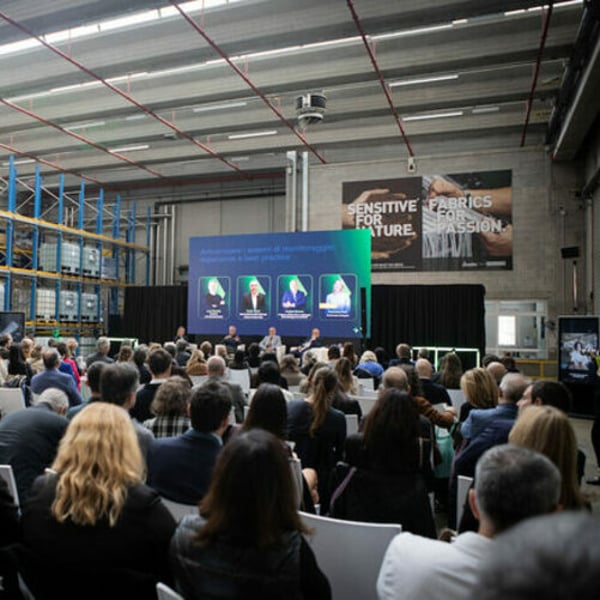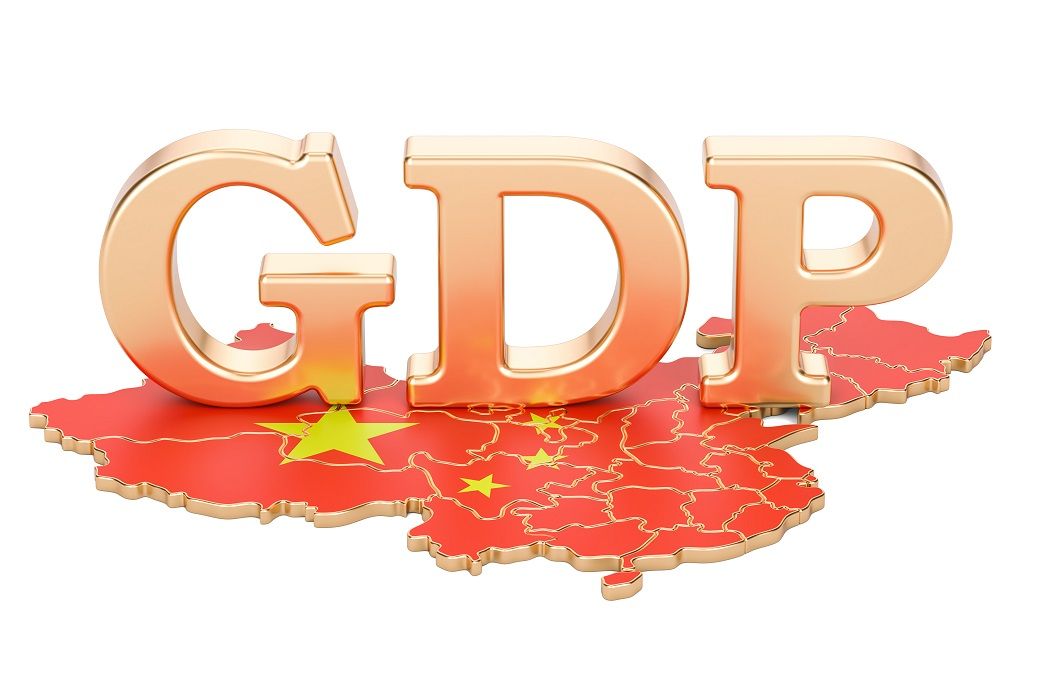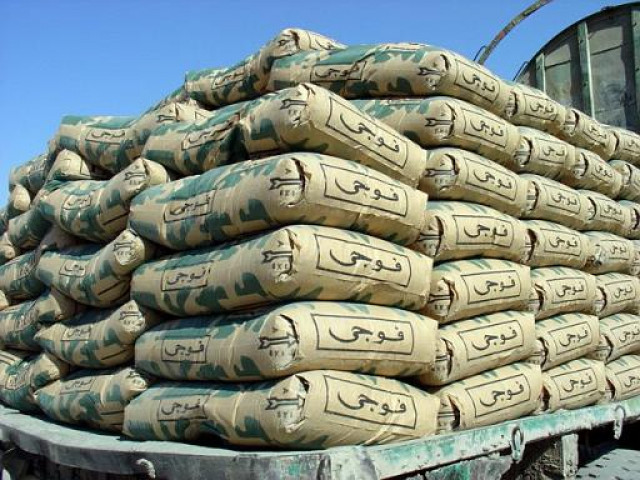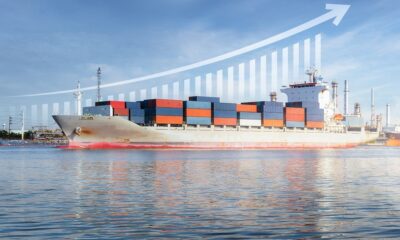Fashion
Data and traceability drive discussions at the 12th “4sustainability” event

Translated by
Nazia BIBI KEENOO
Published
October 7, 2025
The 12th annual 4sustainability event took place on Friday, October 3, at Eurojersey’s headquarters in Caronno Pertusella, Italy. Ympact—an ecosystem that connects brands with their supply chains to track product and process data, monitor compliance, reduce environmental impacts, and optimize operations—organized the gathering.
Ympact, founded by Francesca Rulli and Massimo Brandellero, leads the YHub Group, which counts Foro delle Arti (the holding company of Brunello Cucinelli SpA), Matteo Marzotto, Federico Marchetti, Giorgio Armani SpA, and Fondazione del Tessile Italiano among its shareholders.
More than 500 participants attended in person and online. Speakers centered their sessions on data, traceability, new technologies, and harmonized methods for sustainable fashion.
Eurojersey’s general manager, Andrea Crespi, hosted the event.
“We are proud to host the annual 4sustainability event at Eurojersey, sharing a united message on sustainability with more than 500 players in the Italian textile supply chain,” Crespi said. “Tracking and monitoring production is now fundamental: the added value lies not in what we do but in how we do it inside our factories, a heritage to be protected and preserved for today and for tomorrow. What is produced in our country is expensive because it is made with quality materials, by skilled people and with the best technologies. If we do not understand the importance of this value, the Italian supply chain risks succumbing.”

After opening remarks from Rulli and Crespi, Valentina Boschetto Doorly, associate partner in Italy at the Copenhagen Institute for Futures Studies, presented four megatrends shaping the era—climate change, demographic shifts, technology and artificial intelligence, and deglobalization—and explored their implications for the fashion industry.
“We are in a destabilizing period, which I call the new world disorder; after a historical era of great stability, in which the future was synonymous with progress, today the future is synonymous with anxiety,” Boschetto Doorly said. “The balance is shifting: the economic weight of the new technological economy is in China, the demographic weight is in Africa, which will grow from 1.256 billion in 2017 to 2.528 billion in 2050, doubling its population, while Europe’s population declines. Another reason for destabilization is the transfer of wealth: money is moving from west to east and from east to south, from the real economy to the financial economy (worth ten times the real one), and from the middle classes to the upper classes. In Italy, the largest economic transfer in the country’s history has begun; by 2050, 40 percent of the Italian population will be over 60, while young people are increasingly going abroad—almost 6 million in 2024.”
She also addressed fashion’s role: “Fashion today is bulimic, the life cycle of products is very short, and we no longer know how to distinguish the price of things from their value. The world is regurgitating back at us what we have done to it. Fashion today must be a conscious choice that recognizes our role as guardians of our world.”
Rulli and Brandellero presented Ympact’s vision through the tagline “Tracing Fashion to a Responsible Future.” They emphasized how tracing data, processes, and supply chains enables responsible production models based on harmonized frameworks supported by technology and expert implementation.
Ympact’s system facilitates the adoption of the Digital Product Passport (DPP), mandated by the European Ecodesign Regulation (ESPR), to help brands protect products from counterfeiting—an industry worth $2 billion annually. Michele Zuccheri, head of business development at Certilogo, and Carolynn Bernier, coordinator of the CIRPASS-2 consortium, discussed this topic in a session moderated by Martina Schiuma, head of global strategy and partnerships at Ympact.
A panel then examined how systematic data collection can drive genuine improvements.
Elisa Gavazza, southern Europe and quality management director at ZDHC; Daniele Massetti, regional lead for Italy at the Apparel Impact Institute; Alessandro Barrani, industrial sustainability manager at Prada; and Elisa Santi, sustainability manager at Beste, debated the question in a session moderated by Ester Falletta, technical director at Consorzio Physis and consultant for Ympact.
“With Ympact we are running an excellent project on raw material traceability. This has an impact on the day-to-day relationship between brands and suppliers. Data should not be seen as brand control over the supply chain but as something that strengthens trust and brings transparency,” Barrani of Prada said. “We must explain to suppliers why we collect data and give them the technical tools to do so. In this way, the value of data will become increasingly evident and we will see tangible improvements for the entire ecosystem in terms of competitiveness.”

Santi, representing Beste—a Tuscan company specializing in luxury fabrics and garments and part of the Hind Group—shared the supplier’s perspective:
“When we received requests from brands to be more transparent, we welcomed them as an opportunity. We are a highly vertical company and already had this data; we just weren’t sharing it. In addition to market demands, new regulations have also emerged; it was essential to move in this direction. We adopted a platform with Ympact that enabled us to share data more simply and effectively, giving us greater control over our processes and allowing us to provide end consumers with usable, real-time, and up-to-date data.
The biggest challenge for us has been involving the supply chain—upstream suppliers—who have experienced this as an imposition; we have tried to convey the message that it is also a goal of improvement for them. At Hind Group level, we have a dedicated team that conducts audits at our suppliers’ facilities, involving them and explaining the importance of sharing information. Traceability today should not be seen as an obligation, nor as a finish line; there must be a change in mindset, a greater awareness of data.”
The discussion on supply chain due diligence compared consultancy insights from Franco Amelio, partner at Deloitte, with the perspective of a major brand, Giorgio Armani. Rossella Ravagli, sustainability director at Giorgio Armani, emphasized that brands must commit fully to supplier monitoring systems. To strengthen its long-standing practices, the Armani Group has streamlined its supplier base, imposed clear contractual clauses, and conducted unannounced audits.
“In our contracts, we ask not to go beyond the second tier of supply, because we know that the longer the supply chain, the greater the risks, due, for example, to unauthorized subcontractors. Audits are necessary, even unannounced ones; they are indispensable and should be written into the contractual clauses,” Ravagli said.
“At the governance level, it is essential to adopt and share a code that protects human rights, with a set of requirements laid down in writing and accepted across all tiers of the supply chain, and then properly implemented. The fragmentation of our precious supply chain is a characteristic that is distinctly Italian; suppliers must be protected. At Armani, we have implemented a new tool, building on existing capabilities and accelerating an improvement process that was already underway. It is a technology platform we are developing with Ympact, starting from a solid foundation we already had, thanks to Mr. Armani, who has always encouraged teams to collaborate and share. All suppliers are already on the platform, and in addition to on-site audits, we can also analyze the data. Engagement, involvement, and training of suppliers are essential.”
Speakers emphasized that monitoring systems must be standardized and harmonized to ensure consistency and effectiveness. Without harmonization, suppliers face overwhelming and repetitive requests that lack value. Guided by this principle, Ympact launched 4s ETHIC, a new 4sustainability pillar that enables suppliers to certify their compliance—environmental, social, and reputational—in line with market, due diligence, and legal protocols.
Luca Sburlati, president of Confindustria Moda; Paolo Tondi, Italy certification sales manager at Bureau Veritas; and Andrea Sianesi, professor of operations and supply chain management at Politecnico di Milano, discussed this topic.
“In the first six months of this year, exports fell by 3–4 percent, a figure we expected. What was perhaps not expected is a 6 percent rise in imports, and in particular, a 20 percent increase in products from China. Ultra-fast fashion, whose products are not subject to duties as they are priced below €150, is invading our homes at a dramatic speed,” Sburlati said. “We must pay close attention to what is happening and take countermeasures, creating a supply chain partnership. Of the €90 billion value of textile, fashion, and leather goods, €60 billion is generated by the supply chain; we cannot afford to lose it. Responsibility rests with everyone; today’s attack on Made in Italy is evident.”
Speakers also highlighted the “Memorandum of Understanding for the Legality of Subcontracting in Fashion Production Supply Chains,” signed in May at the Milan Prefecture.
Sianesi explained that collaboration among stakeholders can turn Made in Italy into a global leader in social sustainability by protecting responsible businesses and isolating non-compliant players. He stressed that for this mechanism to succeed in market terms, stakeholders also need incentives that reward sustainable production.
Matteo Ward, CEO of Inside Out Fashion Textiles & Home, closed the event: “In this moment of destabilization, we must find the courage we have always shown in times of crisis to rewrite the rules, without waiting for someone else to do it. To escape the self-constructed cage that forces a choice between sustainability and the status quo, we must remember who we are; raising awareness, collective action, and strong leadership are essential.”

Bringing the event to a close was Matteo Ward, CEO of Inside Out Fashion Textiles & Home: “In this moment of destabilisation, we must find the courage we have always shown in times of crisis to rewrite the rules, without waiting for someone else to do it. To escape the self-constructed cage that forces a choice between sustainability and the status quo, we must remember who we are; raising awareness, collective action and strong leadership are essential.”
This article is an automatic translation.
Click here to read the original article.
Copyright © 2025 FashionNetwork.com All rights reserved.
Fashion
The new economics of fashion: Trust, longevity and price discipline

Fashion demand in 2026 remains intact but more selective, with consumers spending cautiously and prioritising value, durability and versatility.
Intentional purchasing and promotion sensitivity are reshaping pricing dynamics and margin structures.
Polarised consumer behaviour is pushing brands to rebuild trust, justify full price and align sustainability with longevity.
Source link
Fashion
US brand Calvin Klein unveils Spring 2026 denim with Jung Kook

Directed and shot by Mert Alas, the new chapter sharpens the focus on denim as the ultimate expression of personal style through icon Jung Kook’s distinctive and influential point of view as he lives in the moment.
Calvin Klein, owned by PVH Corp., has unveiled its Spring 2026 denim campaign fronted by BTS icon Jung Kook.
Directed and photographed by Mert Alas, the cinematic film fuses music, movement and city energy, highlighting 90s Straight, Baggy and reworked Trucker silhouettes.
A special appearance by Rosie Perez amplifies the brand’s signature visual storytelling.
The campaign unfolds across a series of immersive worlds, unified and guided by Jung Kook’s style, attitude and way of living. The high-impact film fuses fashion and entertainment, moving to an instantly recognizable soundtrack and brought to life through the artist’s signature choreography and commanding presence. The interplay of music and movement – complete with a cameo from New York City legend Rosie Perez – captures the impact synonymous with Calvin Klein’s iconic visual storytelling.
Calvin Klein jeans are at the center of the wardrobe with hero silhouettes leading the narrative: the effortless attitude of the 90s Straight; the relaxed and nostalgic proportions of the Baggy; and new interpretations of the iconic Trucker jacket — all reimagined with elevated washes and designed for versatility. Casual logo tees and oversized bombers complete the looks, reinforcing denim as both uniform and statement.
“I love Calvin Klein jeans because they’re designed to be lived in,” said Jung Kook. “The looks I wore for this campaign nod to ‘90s style while feeling completely modern. It was exciting to bring together my love of music, dance and fashion against the energy of the city.”
Note: The headline, insights, and image of this press release may have been refined by the Fibre2Fashion staff; the rest of the content remains unchanged.
Fibre2Fashion News Desk (RM)
Fashion
China targets 4.5 to 5% GDP growth for 2026

Premier Li Qiang, who delivered the report at the opening of the fourth session of the 14th National People’s Congress in Beijing, said the growth target is “well aligned with the country’s long-range objectives through the year 2035 and is broadly in line with the long-term growth potential of China’s economy, with favorable conditions in place for achieving this target.”
China has set a GDP growth target of 4.5–5 per cent for 2026, alongside goals to stabilise employment, manage inflation, maintain grain output and cut emissions.
The plan also preserves flexibility for structural reforms under the 15th Five-Year Plan, aiming to balance steady economic expansion with long-term, high-quality and sustainable development.
Main development targets for 2026 also include a surveyed urban unemployment rate of around 5.5 per cent, creation of over 12 million new urban jobs, a rise in the consumer price index of around 2 per cent, personal income growth in step with economic growth, a basic equilibrium in the balance of payments, grain output of around 700 million tonnes, and a drop of around 3.8 per cent in carbon dioxide emissions per unit of GDP.
Qiang said the targets took into account the need to leave room for structural adjustments, risk prevention and reform in the opening year of the 15th Five-Year Plan (2026–30) period, to lay a solid foundation for improved performance in the coming years. Government at local level should, taking into account their own conditions, make solid efforts to deliver positive outcomes, he added.
Analysts said the 2026 target reflects a pragmatic approach in recognising structural and cyclical challenges facing the world’s second-largest economy, while pursuing reasonable growth in line with high-quality development.
Fibre2Fashion News Desk (JP)
-

 Business1 week ago
Business1 week agoAttock Cement’s acquisition approved | The Express Tribune
-

 Politics1 week ago
Politics1 week agoWhat are Iran’s ballistic missile capabilities?
-

 Business7 days ago
Business7 days agoIndia Us Trade Deal: Fresh look at India-US trade deal? May be ‘rebalanced’ if circumstances change, says Piyush Goyal – The Times of India
-

 Politics1 week ago
Politics1 week agoUS arrests ex-Air Force pilot for ‘training’ Chinese military
-

 Fashion1 week ago
Fashion1 week agoPolicy easing drives Argentina’s garment import surge in 2025
-

 Business1 week ago
Business1 week agoHouseholds set for lower energy bills amid price cap shake-up
-

 Sports1 week ago
Sports1 week agoSri Lanka’s Shanaka says constant criticism has affected players’ mental health
-

 Sports6 days ago
Sports6 days agoLPGA legend shares her feelings about US women’s Olympic wins: ‘Gets me really emotional’


















